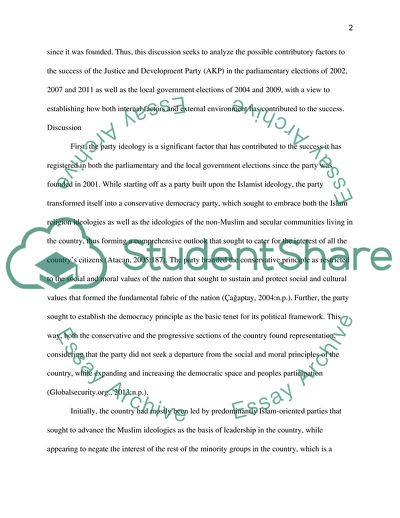Cite this document
(Electoral Success of the Adalet ve Kalknma Partisi Literature review Example | Topics and Well Written Essays - 3000 words, n.d.)
Electoral Success of the Adalet ve Kalknma Partisi Literature review Example | Topics and Well Written Essays - 3000 words. https://studentshare.org/politics/1814710-to-what-factors-should-one-attribute-the-electoral-success-of-the-adalet-ve-kalknma-partisi-justice-and-development-party-in-the-parliamentary-elections-of-2002-2007-and-2011-and-the-local-government-elections-of-2004-and-2009
Electoral Success of the Adalet ve Kalknma Partisi Literature review Example | Topics and Well Written Essays - 3000 words. https://studentshare.org/politics/1814710-to-what-factors-should-one-attribute-the-electoral-success-of-the-adalet-ve-kalknma-partisi-justice-and-development-party-in-the-parliamentary-elections-of-2002-2007-and-2011-and-the-local-government-elections-of-2004-and-2009
(Electoral Success of the Adalet Ve Kalknma Partisi Literature Review Example | Topics and Well Written Essays - 3000 Words)
Electoral Success of the Adalet Ve Kalknma Partisi Literature Review Example | Topics and Well Written Essays - 3000 Words. https://studentshare.org/politics/1814710-to-what-factors-should-one-attribute-the-electoral-success-of-the-adalet-ve-kalknma-partisi-justice-and-development-party-in-the-parliamentary-elections-of-2002-2007-and-2011-and-the-local-government-elections-of-2004-and-2009.
Electoral Success of the Adalet Ve Kalknma Partisi Literature Review Example | Topics and Well Written Essays - 3000 Words. https://studentshare.org/politics/1814710-to-what-factors-should-one-attribute-the-electoral-success-of-the-adalet-ve-kalknma-partisi-justice-and-development-party-in-the-parliamentary-elections-of-2002-2007-and-2011-and-the-local-government-elections-of-2004-and-2009.
“Electoral Success of the Adalet Ve Kalknma Partisi Literature Review Example | Topics and Well Written Essays - 3000 Words”. https://studentshare.org/politics/1814710-to-what-factors-should-one-attribute-the-electoral-success-of-the-adalet-ve-kalknma-partisi-justice-and-development-party-in-the-parliamentary-elections-of-2002-2007-and-2011-and-the-local-government-elections-of-2004-and-2009.


